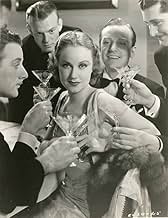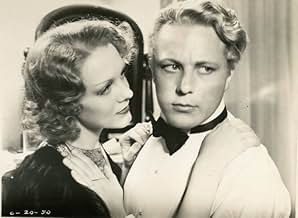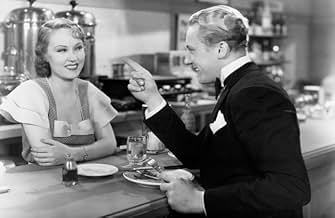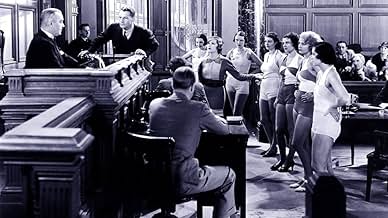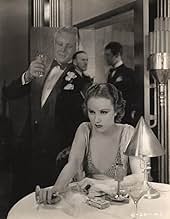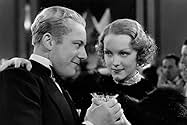Füge eine Handlung in deiner Sprache hinzuAfter graduation from Hampden University, Bill "Lightning" Graham, a football star, and Ann Carver, who just passed her bar exam, marry. Instead of pursuing a career in law, Ann takes on the... Alles lesenAfter graduation from Hampden University, Bill "Lightning" Graham, a football star, and Ann Carver, who just passed her bar exam, marry. Instead of pursuing a career in law, Ann takes on the role of housewife, while Bill is employed as a draftsman. When Ann is asked to take on a ... Alles lesenAfter graduation from Hampden University, Bill "Lightning" Graham, a football star, and Ann Carver, who just passed her bar exam, marry. Instead of pursuing a career in law, Ann takes on the role of housewife, while Bill is employed as a draftsman. When Ann is asked to take on a high-profile legal case, she accepts and wins. She becomes an overnight success and a medi... Alles lesen
- Andrew Simmons - Attorney
- (Nicht genannt)
- Irma Chappelle
- (Nicht genannt)
- Melville - Butler
- (Nicht genannt)
- Baker
- (Nicht genannt)
- Dinner Party Guest
- (Nicht genannt)
- Dinner Party Guest
- (Nicht genannt)
- Coroner
- (Nicht genannt)
- Harrison
- (Nicht genannt)
- Bill's Architect Co-Worker
- (Nicht genannt)
- Bill's Lawyer
- (Nicht genannt)
- Trial Witness
- (Nicht genannt)
Empfohlene Bewertungen
The Grahams get posher digs, they have servants, all on Ann's money. When Bill can't pay the household servants when Ann is away on business, he quits his drafting job and gets a job singing at a club, using his football celebrity as collateral because it means much more money. Unfortunately the other singer who got him this job is played by Claire Dodd. It's always a bad omen to pal around with Claire Dodd in a precode. The Graham marriage breaks apart, and Bill takes to drinking heavily, sometimes with and sometimes without Dodd, whose advances he rebuffs.
Then Dodd's character dies and Bill gets accused of her murder. And in a preposterous development Ann defends him at trial by claiming - truly - that nobody can find a motive for Bill murdering the woman, and -ridiculously - besides it was all her (Ann's) fault because she wanted a career. How dare her! How will this turn out, watch and find out.
What makes this very paint by numbers plot rise a star above mediocre is the twist of how Claire Dodd's character actually dies. Nobody ever figures it out, except the audience, who witnesses the entire thing. The 1930's equivalent of Quincy does not come along and solve the riddle. And I don't think I've ever seen anything quite like it.
Also, there is a very precode courtroom scene, where Ann makes her name. She is defending a breech of promise suit - that is where a man promises to marry a woman and then backs out. In the 30s this could mean big bucks for the woman if the man was rich, and in this case he is. The reason he backed out was that he found out the woman was black. She claimed that he always knew she was black, and that it should have been obvious when they went swimming that she was. That she never hid her race or lied to him. The opposing counsel says that anybody should be able to tell a black woman from a white one. So Ann brings in six women - three white, three black, but all of the same skin color - and demands that the opposing counsel say who is who. The judge breaks up this circus but the point is made and the woman suing the rich man loses. Now this all sounds very racist because it is, but it was cut out of versions of this film shown in the production code era that started the following year because - wait for it - the film is making it look like race is only skin deep AND that a white man could be married to a black woman and never even know it. Oh the horror!
Sometimes even very formulaic old films are worth seeking out for the twenty minutes or so that they are NOT formulaic.
What had happened was that Ann Carver Graham (Fay Wray) and her husband Bill Graham had split up when Ann's career became too great for Bill to handle. Bill finally got a job singing at a local night club that made him happy. But one evening Ann catches Bill in the presents of another woman named Carole Rodgers and thinks the worse. Bill then moves out of the house leaving both Ann and Bill feeling bad about the situation.
When Carole is found dead, Bill is arrested for murder. Ann, his separated wife, will defend him. The case looks bad for Bill but Ann will give a stirring speech to the jurors in order to free the man she loves.
As many already said, this is a B type movie. Most of the acting is poor and the film feel cheaply made. It made be nice to look back and see the fashion of the day but little else can be obtained from this picture.
Although we know attitudes were very different in the 30s, it's still astonishing and thoroughly shocking to see this in the flesh. If you watch a lot of 1930s pictures you start to think that these people are just like you and that times weren't so different. You've grown to regard these little black + white celluloid people as your friends and you feel really let down by them. What's shocking is that it suddenly clicks with you that to these people you thought you knew, all this seemed absolutely normal. Even the bizarre opening court case when a girl is caught pretending to be white, breaking the miscegenation laws was a perfectly aspect of normal life to the society your celluloid friends lived in. It disappoints you. What is particularly saddening is that this is written by Robert Riskin - the champion of the underdog, Columbia's and Frank Capra's star writer, defender of the little man. It could logically be argued that it wasn't him, it was the society he lived in but it's still like finding out that Paddington is a Nazi.
Like WEEKEND MARRIAGE made a year earlier, its theme is identical: a woman's place is in the home and like that film, it's also pretty terribly made. That this was not only made by a top director, Eddie Buzzell but also written by one of the best screenwriters of Hollywood makes no sense for it to be so poor. The cinematography and the overall look of the film is actually quite impressive but the acting is flat and you simply can't engage with them - you have no desire whatsoever to get to know these people. Maybe it's the theme which instantly makes you uneasy so unreceptive to this. Maybe it's because it's so badly acted particularly by Gene Raymond and Claire Dodd. Actually, as second-rate an actress Fay Wray was, she's not too bad in this. She doesn't get good reviews for her performance but compared with her colleagues, she's Meryl Streep. How can she do better with such a self-deprecating role castigating herself for wanting a career, wanting excitement instead of just staying at home to look after her husband and give him a child - sorry, a son?
This is worse than WEEKEND MARRIAGE because at least that was so insanely over the top misogynistic it engaged your emotions even if only to make you furious. With this, despite it looking better and having so much going on every minute, it somehow manages to be boring at the same time.
** 1/2 (out of 4)
Entertaining curio from Columbia has Fay Wray playing a wife turned brilliant lawyer who must defend her estranged husband (Gene Raymond) when he is accused of killing a nightclub singer (Claire Dodd). This is an extremely interesting little gem that manages to be entertaining as a film but also because of the way it showed women and race of the time. The husband ends up leaving the wife because she's making more money than him, which is something he's embarrassed about. Seeing a woman work here way up without using sexuality is something else not all that common from films of this era. The way the film views race is another interesting thing because Wray's first big trial is a black woman charged with dating a white man but not telling him she was black. This entire courtroom scene is rather jaw dropping as even blackface doesn't seen as out of date as this sequence. We see the attorney bring in "questionable" black women who might be white. The entire sequence is surreal, strange and certainly something you probably won't see in too many movies. The biggest problem with the film comes in the final ten minutes when the trial of the husband actually starts. The actual ending is a downright disaster but even worse is how we get to that ending with a certain speech inside the court. It was so bad I actually wanted to hit the mute button. Wray turns in a decent performance, although I think she goes a tad bit over the top during some of the court scenes. Raymond, Dodd and the rest of the supporting cast do fine work and the director keeps everything moving at a nice pace. This is yet another forgotten film that popped up on Turner Classic Movies and it's one more should check out as it gives us a rather interesting insight to some rather strange topics.
Wusstest du schon
- WissenswertesThe scene in which Ann Carver (Fay Wray) wins a breach-of-promise suit for her client by forcing his accuser to lower her dress sleeve to prove that she's really black was inspired by a famous 1924 court case in New York. Socialite Leonard "Kip" Rhinelander sought to have his marriage to former servant girl Alice Jones annulled on the ground that she was half-black and had concealed this from him. In the real case, Jones not only had to expose her shoulder but had to strip from the waist up, and the jury members examined her torso in the judge's chambers to determine the color of her nipples and therefore decide whether she was black or white. Also, unlike the rich client in the movie, Rhinelander lost his case.
- PatzerAlle Einträge enthalten Spoiler
- Zitate
William 'Bill' 'Lightning' Graham: Would you be interested in this?
[holds up some kind of fowl]
Ann Carver Graham: What is it?
William 'Bill' 'Lightning' Graham: It's a Guinea hen.
Ann Carver Graham: No, I don't care for Italian food.
- VerbindungenRemade as The Lady Objects (1938)
- SoundtracksThere's Life in Music
Written by Charles Rosoff
Top-Auswahl
Details
- Laufzeit1 Stunde 8 Minuten
- Farbe
- Seitenverhältnis
- 1.37 : 1
Zu dieser Seite beitragen


